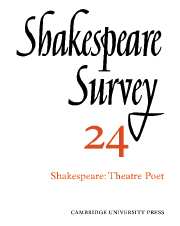Book contents
- Frontmatter
- Hearing Shakespeare: Sound and Meaning in ‘Antony and Cleopatra’
- ‘More Pregnantly Than Words’: Some Uses and Limitations of Visual Symbolism
- Shakespeare and the Limits of Language
- Revenge, Retribution, and Reconciliation
- Shakespeare the Professional
- Shakespeare’s Talking Animals
- The Morality of ‘Love’s Labour’s Lost’
- Shakespeare’s ‘Earth-treading Stars’: the Image of the Masque in ‘Romeo and Juliet’
- ‘Hamlet’ and the ‘Sparing Discoverie’
- ‘Hamlet’ in France 200 Years Ago
- The Hamlet in Henry Adams
- ‘Pericles’ and the Dream of Immortality
- A Necessary Theatre: The Royal Shakespeare Season 1970 Reviewed
- Free Shakespeare
- The Year's Contributions to Shakespearian Study 1 Critical Studies
- 2 Shakespeare’s Life, Times, and Stage
- 3 Textual Studies
- Index
- Plate section
Free Shakespeare
Published online by Cambridge University Press: 28 March 2007
- Frontmatter
- Hearing Shakespeare: Sound and Meaning in ‘Antony and Cleopatra’
- ‘More Pregnantly Than Words’: Some Uses and Limitations of Visual Symbolism
- Shakespeare and the Limits of Language
- Revenge, Retribution, and Reconciliation
- Shakespeare the Professional
- Shakespeare’s Talking Animals
- The Morality of ‘Love’s Labour’s Lost’
- Shakespeare’s ‘Earth-treading Stars’: the Image of the Masque in ‘Romeo and Juliet’
- ‘Hamlet’ and the ‘Sparing Discoverie’
- ‘Hamlet’ in France 200 Years Ago
- The Hamlet in Henry Adams
- ‘Pericles’ and the Dream of Immortality
- A Necessary Theatre: The Royal Shakespeare Season 1970 Reviewed
- Free Shakespeare
- The Year's Contributions to Shakespearian Study 1 Critical Studies
- 2 Shakespeare’s Life, Times, and Stage
- 3 Textual Studies
- Index
- Plate section
Summary
Shakespeare is unique and those who present his plays in the theatre should try to take this into account: usual ways of working may be quite inappropriate.
Matthew Arnold's description of Shakespeare's special qualities has become proverbial:
Others abide our question. Thou art free.
We ask and ask: Thou smilest and art still,
Out-topping knowledge.
In our own words, most of us would agree that we cannot nail down his purposes or be sure that we understand. Returning to a play after a few years, we realise that we have seen only what we had looked for, and that as we have changed so, it seems, has he. But we are also aware of a direct, involving engagement and, like Keats, we will not sit down to read King Lear again without some prologue, at least a moment of adjustment:
once again the fierce dispute,
Betwixt Hell torment and impassioned Clay
Must I burn through. . .
Shakespeare seems to draw us into his creation, into fresh discovery and active imagination: we 'burn through' a re-creation of the play in our own minds.
- Type
- Chapter
- Information
- Shakespeare Survey , pp. 127 - 136Publisher: Cambridge University PressPrint publication year: 1971
- 2
- Cited by

